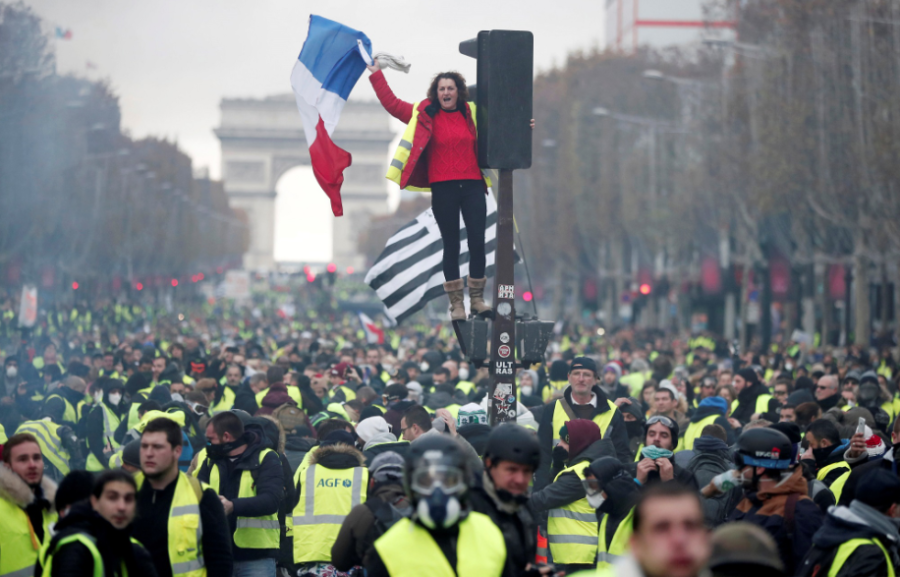New Government Policies Cause an Uprising in France
A woman waves a French flag in Paris during the protest of the French government’s new fuel tax.
For the past three weeks, thousands of French citizens have taken to the streets of France’s major cities in protest of the government’s tax hike on fuel and other French policies.
President Emmanuel Macron returned to France after the G-20 summit meetings in Argentina and addressed the rising tension. An emergency security meeting was held in light of the mass civil disobedience. Security forces were deployed, but the French government has not declared a state of emergency.
The protesters were nicknamed “yellow vests” due to the yellow safety vests they wear. The protests peaked over the weekend of Dec. 1, and the French Interior Ministry estimated that about 136,000 protesters joined the nation-wide rebellion.
Macron announced the green tax on fuel last month as a part of his administration’s environmental policies. The French government claimed the fuel tax would help the country reach their goal of becoming a carbon neutral country by the year 2050.
The majority of the protesters are blaming Macron for the rising tax. Demonstrators believe Macron does not acknowledge the middle and lower classes but favors the rich. During his first year of presidency, Macron approved a $3.2 billion tax cut for the rich and slashed France’s wealth tax.
In Marseille, an 80-year-old woman was hit and killed by a tear gas canister shot through her window during protests. Another three people were killed in the protests. The mayor of Paris, Anne Hidalgo, estimated the protesters have caused nearly $5 million worth of damage to the city of Paris.
French Prime Minister Édouard Philippe announced Tuesday, Dec. 4, that implementation of the fuel tax will be suspended due to the nation’s unrest.
Update: Macron’s government has stated that the tax will no longer be included in the 2018 budget. Also, Macron has agreed to raise minimum wage by €100 ($113.72) a month to appease protesters. However, protests are still taking place throughout France.

Hello! My name is Eric Burschinger, class of 2019. I am VP of Naturally Green, a highly active and award winning environmental club here at Cam High. I...

















































































![Senior Ditch Day... Relaxation or Truancy? [Video]](https://achsstinger.com/wp-content/uploads/2017/10/IMG_7119-900x599.jpg)
![Heavy Rain Hits Cam High [video]](https://achsstinger.com/wp-content/uploads/2017/02/maxresdefault-900x506.jpg)




Zeff • Dec 13, 2018 at 12:42 pm
Even though Macron suspended the gas tax that triggered all of these protests, all the other underlying issues are still present, so the protests aren’t diminishing. The yellow vest protesters have the support of a majority of citizens – including the military and police – and if Macron doesn’t institute serious changes, it wouldn’t be surprising if France attempts a military coup much like Turkey recently tried to do.
Donny Robbins • Dec 10, 2018 at 9:43 pm
It’s sad France is trying to dump all this money in fighting climate change at the expense of the people. The country that is doing the most harm is China, I would like to see them do more to stop climate change. China makes up 29% of fossil fuel emissions while France is only .9% in a 2016 report. The U.S is 14% if you’re wondering.